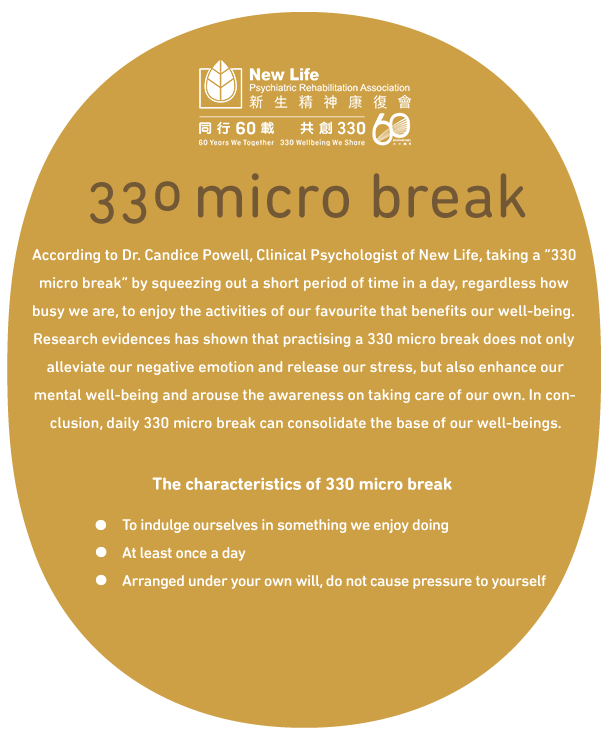
How to turn ordinary activities into a “330 micro break”?
To keep pace with the tempo of our action-packed city, we would think that we cannot afford to devote time to foster our well-being. In fact, even a little bit of time will help – as long as we do something we like doing, no matter how long or how short it is. It will nurture a habit of practising a “330 micro break” and will foster “positive psychology spirit”. We may also practise mindfulness in the process to focus on the present moment.
Some examples of “330 micro break”:
-
Savouring Exercise
What are our favourites? A scoop of ice-cream? A music? A cup of tea or coffee? Let’s taste and experience our favourite activities and pleasant moments thoroughly with curiosity and all our sensations. Positive emotions will be cultivated in the process.
 Please read the article
Please read the article
Guided Audio Exercise -
3-minute Mindfulness Breathing Space Exercise
“Breathe in…Breathe out…” We breathe naturally and automatically. We can make use of breathing, our innate ability, to practise a “330 micro break”. Focusing on the breathing process helps us bring our attention back to the present and let us be with ourselves. We will be more conscious of our present situation and be more aware of the importance of taking care of ourselves.
 Please read the article
Please read the article
Guided Audio Exercise -
Mindful Parenting
Time with our kids is always the most precious moment despite our packed schedule. We can make this precious moment even more pleasurable. Let us feel our kids and give them our wholehearted attention. This will enhance kids’ holistic development and nourish parent-child relationship.
 Please read the article
Please read the article
Guided Audio Exercise -
Happiness Sharing
“Joy shared with others are more enjoyed”. Our happiness will be amplified if we share joy with others with an attentive and earnest attitude. Spending time with our loved ones and sharing with them our pleasant and cherished experience is a good way to practise 330 micro break.
 Please read the article
Please read the article
Guided Audio Exercise -
dayday330 well-being toolkits
330, a Cantonese homonym of Body (3), Mind (3) and represents physical, psychological and social well-being. We can also cultivate our transcendental well-being through connecting to nature, caring for the community and pursuing a meaning life. With a holistic well-being, we can enjoy our life, savour the beautiful things in life, and be more confident and empowered to face challenges.
One of the methods to foster our 330 well-being is to practise 330 micro breaks by indulging ourselves in something we enjoy doing and is good for well-being. Taking a 330 micro break can help reduce stress and relieve emotions. dayday330 team specifically prepared a series of well-being toolkits for the general public and organizations to practise 330 micro breaks. The toolkits mainly cover two of the themes of 330 micro break —“Savouring” and “Mindfulness”*. We sincerely hope that everyone will “Leave Yourself a Space for Your Well-being—330” ,to temporarily put aside everything and take a 330 micro break with the videos or guided audios in order to nurture our 330 well-being and reach the goal of dayday330—fostering well-being every day.

Guided practice videos (Script in Cantonese with English subtitles): https://youtube.com/playlist?list=PLr8HXjSCTh4UD0cs9M2BuHTPSbSESpvS_
Guided audios (Script in Cantonese with English subtitles): https://nlpra-my.sharepoint.com/:f:/g/personal/dayday330_nlpra_org_hk/EtXyaQpoZKdFkoye6Y6D0MkBRqg_h_Auz4xLwtSbDZKbFg?e=c7nPFU
* In positive psychology, “savouring” is a way to maximize positive experiences, an attitude that can help us be more attentive and be engaged in the moments we enjoy. We can consciously focus on our sensory enjoyment, commit fully in each moment to be present; , thereby making the experience more enjoyable, and keeping the feeling of enjoyment going.
* According to the definition by the founder of “Mindfulness-based Stress Reduction course, Dr. Jon Kabat-Zinn, Mindfulness means paying attention in a particular way; on purpose, in the present moment, and non-judgmentally to understand oneself and cultivate wisdom and compassion.” In the past 30 years, Mindfulness has been broadly applied in medical and psychological studies. Many scientific and clinical experiments have also shown that Mindfulness practice helps improve overall mental health state, including but not limited to stress reduction, focus enhancement, improvement of interpersonal relationships and well-being.








